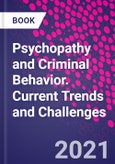Psychopathy and Criminal Behavior: Current Trends and Challenges fills a gap in the market by covering new topics and angles not addressed in other literature. The book's authors approach the interaction of psychopathy with different types of crime, reflecting on comorbidity with other disorders, symptoms and emotional function. In addition to examining questions of prevention and treatment, they present new developments with solid theory and scientific evidence, also addressing forensic realities. This is a must-have guide for practitioners, students or anyone interested in psychopathy, criminal behavior and the various avenues of treatment.
Please Note: This is an On Demand product, delivery may take up to 11 working days after payment has been received.
Table of Contents
1. Practical considerations for the clinical and forensic use of psychopathy
2. The emergence and development of psychopathy
3. Neural correlates of psychopathy: A comprehensive review
4. Emotional functioning in psychopathy. A critical review and integration with general emotion theories
5. The development of psychopathy through the lifespan and its relation to offending
6. Assessment of psychopathy and antisocial behavior
7. The concept of psychopathy and risk assessment: Historical developments, contemporary considerations and future directions
8. Communicating with psychopaths in law enforcement settings
9. Negotiating with the psychopathic hostage taker
10. Interviewing psychopaths: Toward a science of investigative interviewing of psychopathic suspects
11. Psychopathy evidence in�legal proceedings
12. Psychopathy,�offending style and crime scene behavior
13. Psychopathy and drug-related crime and violence
14. Are gang members psychopaths?
15. Psychopathy and sexual offending over the life course: An exploratory longitudinal investigation
16. Psychopathy is integral to understanding homicide and violence
17. Psychopathy in human trafficking offenders: Current trends and challenges
18. Psychopathy and terrorist involvement
19. Psychopathy and corporate crime
20. Psychopathy: Cybercrime and cyber abuse
21. Psychopathy and animal cruelty offenders
22. Treatment of psychopathic offenders: A Review of research, past, and current practice








